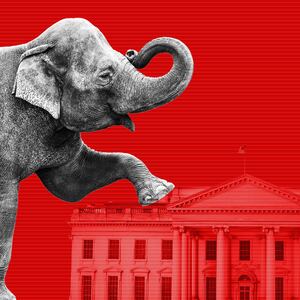As we all know, since the Democrats took control of the House, President Donald Trump has tried to frustrate all congressional investigations of his misconduct, culminating with his demand that government agencies and witnesses refuse to comply with every subpoena the House issued in its impeachment investigation.
But here’s a funny thing. If Trump prevails on challenges to Congress’ oversight powers now before the Supreme Court, he may also limit the ability of his congressional allies to embark on the witch hunts Trump wants them to pursue against his political adversaries. Why? Because, in order to protect the president, Trump’s own lawyers and Bill Barr’s Justice Department are asking the Court to effectively bar Congress from investigating allegedly corrupt public officials.
Before the Senate had reached a verdict in its witness-free trial of Donald Trump, Senator Lindsey Graham declared that the “day of reckoning is coming for congressional and Senate oversight of Joe Biden.” Graham said that he’s determined to do Trump’s bidding by getting “to the bottom” of Trump’s conspiracy theory that Biden improperly forced the firing of a corrupt Ukrainian prosecutor to protect his son Hunter from an apparently non-existent investigation. Senator Ted Cruz seconded Graham’s call, declaiming that Trump is “justified in asking for this investigation” of “corruption that goes to the very highest levels of government.”
Last week, we learned that the Treasury Department has already furthered this Biden witch hunt by turning over highly confidential “suspicious activity reports,” likely related to Hunter Biden’s personal financial dealings, to GOP senators and that Graham’s colleagues are seeking other government records. On Sunday, Graham said he spoke to Barr about “verify[ing]” dirt Rudy Giuliani claims to have on the Bidens. All of this is likely leading toward the issuance of a Senate subpoena to Hunter Biden, and possibly his father.
And yet, Trump’s Justice Department, along with his personal lawyer, Jay Sekulow, are now seeking to convince the Supreme Court that legislators should be largely barred from investigating lawbreaking, including by government officials.
As an appellate court explained in rejecting Trump’s challenges, courts have long recognized that investigations into misconduct relevant to matters of potential legislative action are integral to the Congress’s legislative function. Its investigations into such potential wrongdoing have ranged from the multiple failed House inquiries during the Obama administration into Hillary Clinton’s supposed culpability in the terrorist attack on the U.S. consulate in Benghazi (including one pursued by then Representative Mike Pompeo) to the Senate investigation of the Teapot Dome corruption scandal during the presidency of Warren Harding.
Furthermore, Congress has long investigated potential misconduct by presidents. The most high-profile such investigation was the Senate select committee investigation of Watergate that culminated with John Dean’s testimony about President Nixon’s involvement in the cover-up, and Alexander Butterfield’s disclosure of the White House tapes.
While presidents have rarely cheered on congressional oversight investigations into their conduct, or that of their appointees, no modern president has broadly challenged Congress’ constitutional authority to conduct such inquiries. Until Donald Trump, that is.
During April 2019, the House issued subpoenas to Trump’s accounting firm, Mazars, as well as several banks he did business with, seeking a range of financial records, including Trump’s tax returns. The House has explained that it is investigating possible corrupt and otherwise illegal conduct, including Trump’s hush money pay-offs to former paramours during the months leading up to the 2016 election, as well as the potential laundering of money on behalf of foreign investors in Trump properties.
Trump categorically refused to respond to the subpoenas and filed two lawsuits, one in a New York federal court, and one in the District of Columbia, challenging the House subpoenas in their entirety (just as he challenged a subpoena by the Manhattan District Attorney for the same materials). Trump’s challenges to the House subpoenas were rejected by two sets of both trial and appellate courts, and are now being reviewed by the Supreme Court (which is also hearing a challenge to the DA’s subpoena).
William Barr’s DOJ has fully endorsed Trump’s stonewalling, and has filed briefs supporting the positions taken by Sekulow. In its Supreme Court brief regarding the House subpoenas, the DOJ argues that Congress’s oversight authority to investigate corruption and illegality is actually tightly constrained, calling into question the permissibility of the kinds of oversight investigations Congress has regularly undertaken for decades.
According to the DOJ, congressional investigations into illegal conduct by individuals, including the president, are extremely problematic, because they can lack a “valid legislative purpose” and may instead be directed at, heaven forbid, “exposing illegality for its own sake.” The Congress, DOJ asserts, lacks the power to expose illegal conduct “for the sake of exposure,” and therefore should be prevented from focusing its investigations upon “private” misconduct, including where such “private” conduct is criminal and corrupt.
If the Supreme Court adopts the Trump DOJ’s radically constrained account of Congress’s investigative oversight authority, Trump will likely succeed in neutering much of the House’s ability to investigate potential illegalities.
First, if the Supreme Court accepts Trump’s argument, the investigation into the Biden conspiracy theory that Graham and his senate colleagues have committed to pursuing at Trump’s behest would be strictly constrained, if not ended. According to Sekulow and the DOJ, it is precisely such efforts to inquire into “personal” corruption that are outside Congress’s oversight power. Indeed, should Trump’s argument be accepted, large swaths of Congress’ normal course of investigative oversight activities touching upon potentially illegal conduct will be rendered invalid.
Second, if Trump and the DOJ prevail, they may also render a future Republican Congress largely powerless to inquire into alleged misconduct by a future Democratic President. Indeed, Trump and the DOJ argue that Congress’ ability to investigate potential wrongdoing by a sitting president is even more limited than its purported limited ability to investigate misconduct by other citizens. According to the DOJ, the Congress must meet a “heightened standard of clarity” to justify inquiring into presidential misconduct.
Accordingly, if Trump’s argument is accepted, not only he but also his successors could be largely immunized from congressional investigations into their own misconduct outside the impeachment context. Furthermore, as we recently saw, a president who is willing to stonewall has broad latitude to frustrate an impeachment inquiry, as well. Accordingly, the legacy of the Trump administration could well be a largely hamstrung Congress that has lost the investigative authority it has long used to uncover misconduct by both Democratic and Republican presidents.
As the impeachment trial demonstrated, Republican legislators have been more than willing to trade away the constitutional authority of Congress in order to protect Donald Trump. Yet as the unanticipated consequences of Trump’s stonewalling arguments begin to play out in the courts and the halls of Congress, some Republican officeholders may soon begin to regret just how much they have given up to allow the current president to break the law without consequence.







